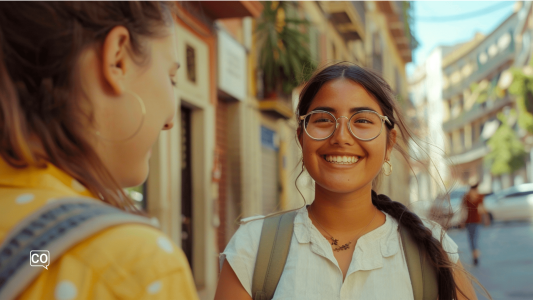Spanish A1.3.1 Ana and Pedro talk about their roots Share Copied!
Ana and Pedro see each other for the third time. They start by talking about their origins, nationality, and countries.
Diálogo: Ana y Pedro hablan de sus raíces
Ana y Pedro se ven por tercera vez. Empiezan hablando sobre sus orígenes, nacionalidad y países.

A1 Spanish
Level: A1
Module 1: Presentarse (To introduce oneself)
Lesson 3: ¿De dónde eres? (Where are you from?)
Teaching guidelines +/- 15 minutes
Audio and video
Conversation
| 1. | Pedro: | ¡Hola! ¿De dónde eres? | (Hello! Where are you from?) |
| 2. | Ana: | Soy de Francia. Soy francesa. | (I am from France. I am French.) |
| 3. | Pedro: | Soy de España. Soy español. | (I am from Spain. I am Spanish.) |
| 4. | Ana: | ¿Dónde vives? | (Where do you live?) |
| 5. | Pedro: | Vivo en Bruselas, la capital de Bélgica. | (I live in Brussels, the capital of Belgium.) |
| 6. | Ana: | Yo vivo en Alemania, en Berlín. | (I live in Germany, in Berlin.) |
| 7. | Pedro: | ¿Dónde vive tu familia? | (Where does your family live?) |
| 8. | Ana: | Mi familia vive en España y en Polonia. | (My family lives in Spain and Poland.) |
| 9. | Pedro: | ¿En qué ciudad de Polonia? | (In which city of Poland?) |
| 10. | Ana: | En Varsovia, la capital del país. | (In Warsaw, the capital of the country.) |
| 11. | Pedro: | ¡Qué bonita es Varsovia! | (How beautiful Warsaw is!) |
